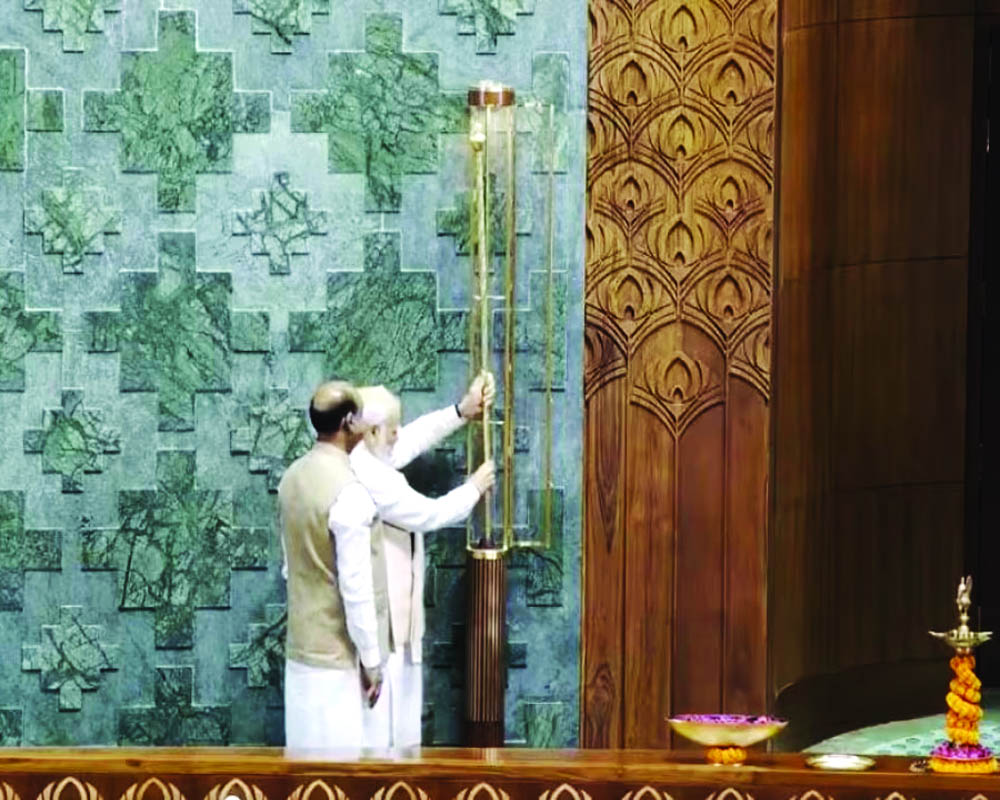The ‘Sengol’ has been installed next to the Speaker’s chair by the PM in new Parliament
‘sengol' has been quoted in Tamil literature very extensively for the various attributes it presents. The essential meaning of righteousness for SENGOL refers to a ruler’s dispensation of justice to his citizens, even if it is detrimental to the King or the King’s family. If the King fails in his duty either due to failure to cross-verify the facts, deliver justice in haste, overlook the facts before him, or due to circumstantial evidence or sheer human error, he is bound to fall from the grace of people, and he is also expected to face the punishment for failing to give justice, which must be imposed on him by himself.
This is where the King is expected to have the grace of the Almighty in acquitting himself well while delivering justice in extremely complicated cases. There were times when to know the truth, the King prayed to the Almighty to give a clue of what went on at the crime scene, and when he got the clue, he gave the right judgement. A lady was pierced with an arrow and died when she was under the tree with her husband.
The husband noticed a hunter with a bow and arrow in the surroundings, and he accused the hunter of killing his wife with his arrow. But the hunter firmly denied that he did not shoot the arrow. The King came to know the truth with the Divine Grace: the arrow had been pierced in one of the leaves of the tree earlier, and when the couple was resting under the tree, it fell on the lady, and thereby the lady lost her life.
When the King delivers a wrong judgement, even an ordinary citizen may reach out to him in his assembly and raise the wrongdoing of the King with evidence. When Kannaki’s husband was wrongly executed by the then Pandya King for stealing the anklet of the Queen, she proved before him that her anklets were made of rubies, whereas the Queen’s anklets were made of pearls. The Pandya King realised his mistake of delivering wrong justice, fell from his seat, and expired instantly after uttering, "I am not the King, and I am the thief". The SENGOL also gave dutiful power to the King to punish those who disturb the peace in society and those who resort to heinous crimes of theft, robbery, and murder.
The lyrics written by SANGAM lady poet Avvaiyar indicate the prosperity angle of Sengol'. In her lyrics, she said, "When the paddy field embankment height increases, the water level in the field raises, thereby the paddy crop grows well, resulting in a high yield, and that will raise the economic condition of the citizens (farmers in particular), and as a result, the Senkol' will raise, and ultimately it will result in the increase in the status of the King himself. In a democratic setup, we rule ourselves; the king refers to the citizenry, and hence, as the paddy field embankment rises, the SENGOL rises, and the country and its citizenry will prosper.
The Sengol' embodied the good governance, prosperity, justice and fairness, unity, safety, security, and well-being of the citizens, as well as the authority, might, legitimacy, unity, integrity, and sovereignty of a nation. It is befitting on the part of the Indian government to bring back the Indian pride from Prayagraj Nehru Museum and install it as Sengol' next to the Lok Sabha speaker in the new Parliament Hall.
(The author is a Public Policy Analyst)

























